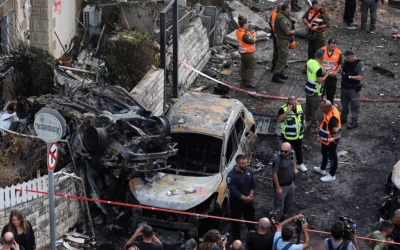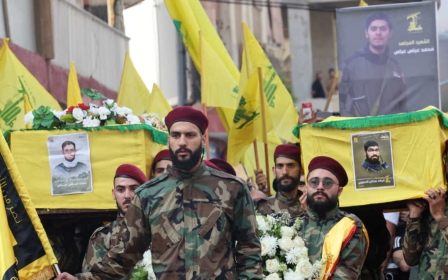US pushing for 21-day truce between Israel and Hezbollah to avert wider war

The Biden administration is hoping to broker a weeks-long truce between Israel and Hezbollah in the hopes that it can provide an off-ramp to all-out war, an Arab official and former US official told Middle East Eye on Wednesday.
The Arab official, who requested anonymity due to sensitivities around the talks, said that officials from the Biden administration were speaking with their Lebanese and French counterparts to push for a deal.
The former senior US official told MEE that Washington was aiming to broker a 21-day pause in fighting.
A US official in the region also confirmed to MEE that a "big push" was underway to to de-escalate the situation as the death toll in Lebanon since Monday climbed over 620.
Early on Thursday, the US, UK, France, Saudi Arabia, Qatar and several other countries called for an "immediate" 21-day ceasefire to allow for negotiations in the conflict.
New MEE newsletter: Jerusalem Dispatch
Sign up to get the latest insights and analysis on Israel-Palestine, alongside Turkey Unpacked and other MEE newsletters
A joint statement released on the sidelines of the United Nations General Assembly in New York said the recent fighting was "intolerable and presents an unacceptable risk of a broader regional escalation."
"We call for an immediate 21-day cease-fire across the Lebanon-Israel border to provide space for diplomacy," the statement read.
"We call on all parties, including the governments of Israel and Lebanon, to endorse the temporary ceasefire immediately."
The announcement by the White House didn't go into details about the proposal, but in a telephone briefing with reporters, senior US officials said both Israel and Hezbollah were going to respond.
"They are familiar with the text, and again, we'll let them speak to their actions of accepting the deal in the coming hours," a US official said.
They added that 21 days "would be a sustained space that was long enough to allow for negotiations on a realistic basis, to be able to reach a complicated agreement."
Hezbollah has long said it would agree to a deal with Israel but only if a ceasefire was first reached in Gaza.
'No desire'
World leaders, including US President Joe Biden, France’s Emmanuel Macron, and Lebanon's caretaker Prime Minister Najib Mikati have been at UN headquarters this week for the annual General Assembly.
The US relies on Lebanon's government to ferry messages to Hezbollah, a US-designated terror organisation.
Since Monday, Israel has dramatically expanded its aerial assault on Lebanon, and on Wednesday, Israeli military officials told troops to prepare for a potential ground incursion, saying air strikes were being conducted "to prepare the ground for your possible entry."
'The ground manoeuvre is not only a threat but something Israel plans although there is no desire to implement this'
- Michael Milshtein, former Israeli intelligence officer
Michael Milshtein, a former Israeli intelligence officer, told MEE that Israel would likely deploy ground troops to Lebanon in the event Hezbollah launches a massive strike on Tel Aviv or if fighting continues for weeks on end.
"The ground manoeuvre is not only a threat but something Israel plans although there is no desire to implement this," he said.
The escalation is a major challenge for the Biden administration, which former US officials tell MEE was angered by Israel's decision to launch more than 1,000 strikes on Lebanon earlier this week.
MEE revealed on Tuesday that Israel submitted a three-page request for munitions and arms to refill existing stockpiles, underscoring how it may be girding for a longer war, including arrow system missile interceptors.
One senior US official and a former US official told MEE that the White House and State Department were slow-rolling the request amid anger at Israel as it escalates in Lebanon.
But the US has previously ruled out using arms sales to leverage Israel into a ceasefire in Gaza and the success of this US truce initiative is far from guaranteed.
Hezbollah 'on backheels'
The Biden administration has been negotiating for months to achieve an elusive ceasefire in Gaza, but those talks have stalled.
The former senior US official and Arab official, however, cautioned about making comparisons between Hezbollah and Hamas, saying US, French and Arab officials believe the reality on the ground in Lebanon is different and might make a truce between Hezbollah and Israel more achievable.
“Israel has put Hezbollah on their backheels. They aren’t in a good position,” the former US official said.
Hezbollah and Israel have exchanged near daily fire since 8 October, after the group began firing rockets at Israel in what it said was solidarity with besieged Palestinians in Gaza.
But fighting seriously escalated last week after Israel detonated thousands of pagers and walkie-talkies used by Hezbollah members. The attacks decimated Hezbollah’s communications and command and control network, analysts say.
On Monday Israel launched widespread air strikes against what it said were Hezbollah fighters, missile sites and arms warehouses. The attacks have killed at least 600 people.
Hezbollah, the world’s largest non-state armed actor, is also Lebanon’s most powerful political party, but the Lebanese movement backed by Iran doesn’t enjoy dominant support in Lebanon which is divided among Christians, Sunni and Shia Muslims.
Israel’s attacks were initially concentrated in southern Lebanon and the Bekaa Valley, the traditional heartlands of Hezbollah, but on Wednesday they were expanded to the northern suburbs of Beirut and parts of Mount Lebanon.
At least 90,530 people have fled the strikes, the International Organisation for Migration has said.
Middle East Eye delivers independent and unrivalled coverage and analysis of the Middle East, North Africa and beyond. To learn more about republishing this content and the associated fees, please fill out this form. More about MEE can be found here.





